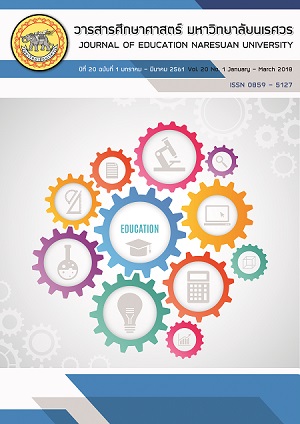การศึกษาผลสัมฤทธิ์ทางการเรียน เจตคติต่อวิชาชีววิทยา และพฤติกรรมการทำงานร่วมกันของนักเรียนชั้นมัธยมศึกษาปีที่ 6 ที่ได้รับการจัดการเรียนการสอนแบบสืบเสาะหาความรู้ 7 ขั้น (7E) ร่วมกับการเรียนการสอนแบบร่วมมือเทคนิค STAD; THE STUDY OF ACHIEVEMENT, ATTITUDE...
Main Article Content
Abstract
การวิจัยครั้งนี้มีวัตถุประสงค์เพื่อศึกษาผลสัมฤทธิ์ทางการเรียน เจตคติต่อวิชาชีววิทยา และพฤติกรรมการทำงานร่วมกันของนักเรียนชั้นมัธยมศึกษาปีที่ 6 ที่ได้รับการจัดการเรียนการสอนแบบสืบเสาะหาความรู้ 7 ขั้น (7E) ร่วมกับการเรียนการสอนแบบร่วมมือเทคนิค STAD กลุ่มตัวอย่าง คือ นักเรียนชั้นมัธยมศึกษาปีที่ 6 โรงเรียนชลกันยานุกูล จังหวัดชลบุรี 1 ห้องเรียน จำนวน 34 คน ได้จากการสุ่มแบบกลุ่ม เครื่องมือที่ใช้ในการวิจัย ได้แก่ แผนการจัดการเรียนการสอนแบบสืบเสาะหาความรู้ 7 ขั้น (7E) ร่วมกับการเรียนการสอนแบบร่วมมือเทคนิค STAD วิชาชีววิทยา เรื่องระบบนิเวศ แบบทดสอบวัดผลสัมฤทธิ์ทางการเรียนวิชาชีววิทยา แบบวัดเจตคติต่อวิชาชีววิทยา แบบสังเกตพฤติกรรมการทำงานร่วมกัน สถิติที่ใช้ ได้แก่ การทดสอบค่าที (t-test) ค่าเฉลี่ย และค่าความเบี่ยงเบนมาตรฐาน ผลการวิจัย พบว่า
1. นักเรียนที่ได้รับการจัดการเรียนการสอนแบบสืบเสาะหาความรู้ 7 ขั้น (7E) ร่วมกับการเรียนการสอนแบบร่วมมือเทคนิค STAD มีผลสัมฤทธิ์ทางการเรียนวิชาชีววิทยาหลังเรียนสูงกว่าก่อนเรียน อย่างมีนัยสำคัญทางสถิติที่ระดับ .05
2. นักเรียนที่ได้รับการจัดการเรียนการสอนแบบสืบเสาะหาความรู้ 7 ขั้น (7E) ร่วมกับการเรียนการสอนแบบร่วมมือเทคนิค STAD มีผลสัมฤทธิ์ทางการเรียนวิชาชีววิทยาสูงกว่าเกณฑ์ร้อยละ 70 อย่างมีนัยสำคัญทางสถิติที่ระดับ .05
3. นักเรียนที่ได้รับการจัดการเรียนการสอนแบบสืบเสาะหาความรู้ 7 ขั้น (7E) ร่วมกับการเรียนการสอนแบบร่วมมือเทคนิค STAD มีเจตคติต่อวิชาชีววิทยาหลังเรียนสูงกว่าก่อนเรียน อย่างมีนัยสำคัญทางสถิติที่ระดับ .05
4. นักเรียนที่ได้รับการจัดการเรียนการสอนแบบสืบเสาะหาความรู้ 7 ขั้น (7E) ร่วมกับการเรียนการสอนแบบร่วมมือเทคนิค STAD มีพฤติกรรมการทำงานร่วมกันสูงขึ้น และอยู่ในระดับดี
THE STUDY OF ACHIEVEMENT, ATTITUDE TOWARDS BIOLOGY AND GROUP WORK BEHAVIORS OF MATTHAYOMSUKSA 6 STUDENTS WHO LEARNED BY 7E LEARNING CYCLE AND THE COOPERATIVE LEARNING BASED ON STAD TECHNIQUE
The purpose of this research was to study learning achievement, attitude towards biology and group work behaviors of Matthayomsuksa 6 students who learned by 7E learning cycle and the cooperative learning based on STAD technique. The participants consisted of 34 Matthayomsuksa 6 students at Chonkanyanukoon School Chon Buri. They were randomly selected by using the cluster random technique. The research instruments included biology lesson plans by using the 7E learning cycle and the cooperative learning based on STAD technique in the topic of ecology, a biology achievement test, an attitude towards biology test and a group work behaviors test. The data were statistically analyzed by using t-test, average and standard deviation. The results that;
1. The biology learning achievement after learning by 7E learning cycle and the cooperative learning based on STAD technique was significantly higher than those before learning at .05.
2. The biology learning achievement after learning by 7E learning cycle and the cooperative learning based on STAD technique was significantly higher than criterion 70% at .05.
3. The attitude towards biology after learning by 7E learning cycle and the cooperative learning based on STAD technique was significantly higher than those before learning at .05.
4. The group work behaviors after learning by 7E learning cycle and the cooperative learning based on STAD technique was increased in a good level.
Article Details
The owner of the article does not copy or violate any of its copyright. If any copyright infringement occurs or prosecution, in any case, the Editorial Board is not involved in all the rights to the owner of the article to be performed.
References
Chinno, B. (2013). Alternative: Development of the STAD cooperative learning in conjunction with the mathematical modelling affecting mathematical problem solving abilities, teamwork behaviors, and attitudes toward mathematics of Mathayom Suksa 4 Students (Master thesis). Sakon Nakhon: Sakon Nakhon Rajabhat University. (in Thai)
Kiatsomkit, N. (2008). A comparison of chemistry learning achievement entitled chemistry bonds and integrated science process skills of matthayomsuksa 4 students taught using the STAD cooperative learning method and the conventional method (Master thesis). Lopburi: Thepsatri Rajabhat University. (in Thai)
Ministry of Education. (2008). The Basic Education Core Curriculum B.E. 2551 (A.D. 2008). Bangkok: The Agricultural Cooperative Federation of Thailand. (in Thai)
Parawach, W. (2007). The development of Mathayomsuksa IV students' achievement in biology I on the topic: Cell division by 7E inquiry cycle teaching model (Master thesis). Ubon Ratchathani: Ubon Ratchathani University. (in Thai)
Phuvipadawat, S. (2011). Teaching for student development and authentic assessment. Bangkok: Duangkamol Publishing. (in Thai)
Saiyod, L., & Saiyod, A. (2000). Measurement techniques. Bangkok: Suweeriyasarn. (in Thai)
Samongdee, T. (2013). The effect of biology learning in genetic inheritance by using the 7E-Learning cycle on learning achievemnt, analytical thinking and scientific attitudes of mathayomsuksa four students MAT (Master thesis). Chonburi: Burapha University. (in Thai)
Sintapanon, S., Sukying, F., Weerakiatsoontorn, J., & Naparat, P. (2011). Teaching methods accordance with educational reform for developing youth quality. Bangkok: 9119 Technic Printing. (in Thai)
Srisopa, K. (2012). Comparisons of learning of Matthayomsuksa 4 students' reproduction and growth of animals, analytical thinking and attitude towards biology between who learned by using 7E- learning cycle and the 4 MAT (Master thesis). Maha Sarakham: Mahasarakham University. (in Thai)
Techacupt, P. (2001). Student-centered instruction: concept, teaching method and technique. Bangkok: The Master Group Management. (in Thai)
The National Institute of Educational Testing Service (Public Organization). (2013). O-Net result report of Matayomsuksa VI in 2556 academic year. Retrieved February 25, 2015, from https://www.niets.or.th/ (in Thai)
Williams, M. S. (1989). The effect of cooperative teams learning on student achievement and student attitude in the classroom. Computer software. DAI 49/12A.
Wingwalai, S. (2013). Learning management. Bangkok: Odian Store. (in Thai)


